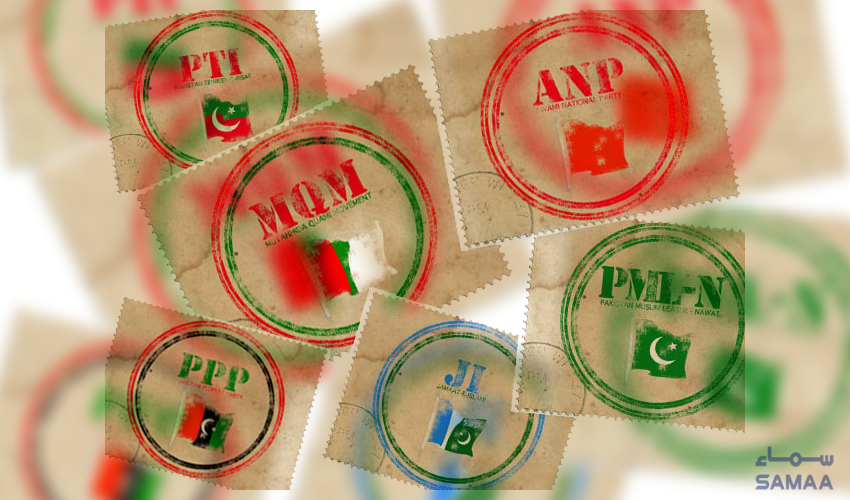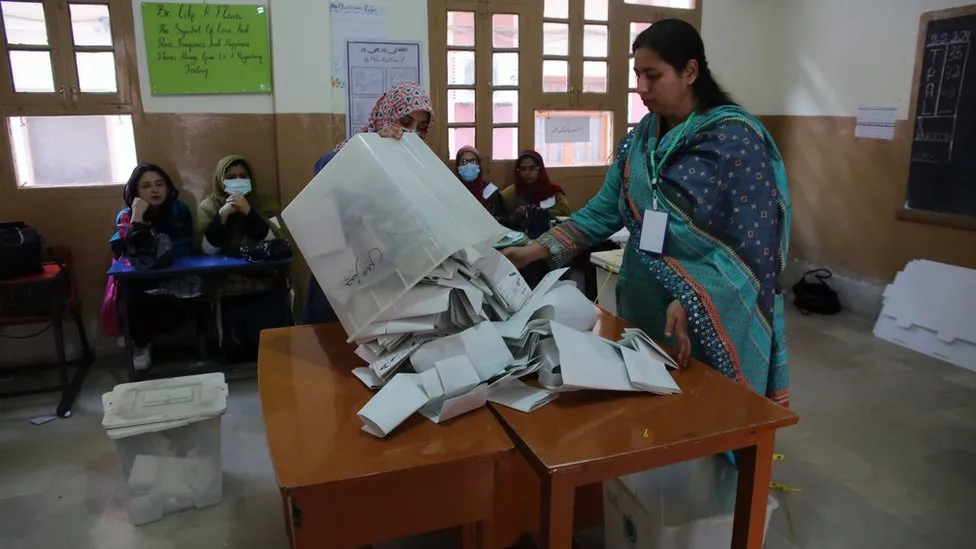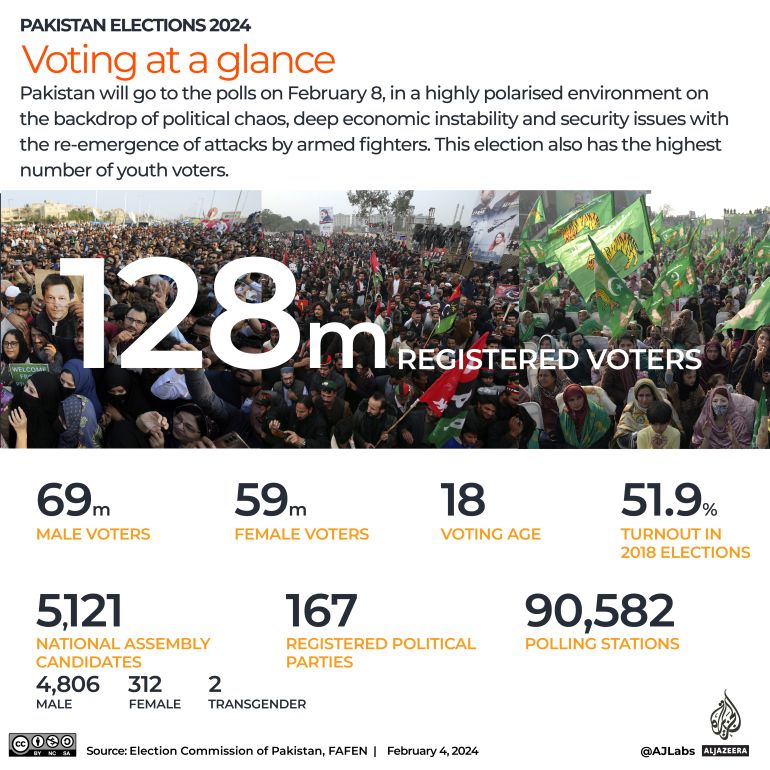The Baloch nationalist parties, from across all of the ethnicities there, called for a general strike on 18 February across the province. Balochistan went on strike against Pakistan's election results in the provine.
Sunday, February 18, 2024
Sunday, February 11, 2024
Pakistan's political leadership needs to quickly stand up a coalition government
Pakistan's political leadership has a chance to re-calibrate the state and enforce civilian supremacy if they unite. The overwhelming turnout of the Pakistani voter has handed the civilian leadership of the country a historic chance to push back against the generals.
The election of 2024 was supposed to happen in 2023. After Imran Khan's government was removed in a vote of no confidence in 2002, after the Pakistan Muslim League - Nawaz (PML-N) and the Pakistan People's Party (PPP) along with some smaller parties joined together in the Pakistan Democratic Movement (PDM) to oust Imran's Pakistan Tehreek-e-Insaf (PTI) government. The PDM saw the chance to take control of the government and they did, with former three-time Prime Minister Nawaz Sharif's brother Shahbaz Sharif becoming the new Premier of Pakistan after Imran Khan. This guy was and is, a crazy extremist and he lived up to the reputation he had gathered as the manic Chief Minister of Pakistan's largest province, Punjab. He spent a week complaining about blasphemy against Islam in Sweden (a statement would have been enough) while causing back breaking inflation in Pakistan by implementing an IMF plan that saw oil prices double along with the cost of everything else in the country. Shahbaz was notorious during his stints as Chief Minister of Punjab for having terrorists from Islamic extremist groups killed extra-judicially by the Punjab police. This guy was (and is) nuts. Maybe all of this is why when his family's party went to the polls on Thursday, the entire country just seemed to kick his brother's party in the teeth.
 |
| Source: Al Jazeera. |
The Imran Khan government was called a hybrid regime because it was brought into power by the Army. Hopes that the PDM government of Shahbaz Sharif would prove itself as a re-assertion of some actual democracy were dashed when it became clear that the extra-judicial disappearances and tortures would continue. This hybridity was enforced by Shahbaz's strange and maniacal behaviour along with his and his party and allies willingness to be used as a cover by the Pakistan Army to institute un-popular structural adjustments by the IMF and the World Bank that doubled prices in the second half of 2022 and through 2023. The floods in August 2022 made things worse. The consequences of all this was felt in the spring of 2023 when Imran Khan and his party suicide bombed the constitutional structre of Pakistan by rioting across the country and attacking Army bases when now ex-PM Imran Khan was faced with his first arrest. This stupid Pakistani reboot of the 6 January 2021 attack on the US Capitol gave the Army carte blanche to start not just arresting, but kidnapping and torturing members of Imran Khan's party, disappearing them into military dungeons and doing this especially to the leadership of the party. Once the PTI attacked Pakistan Army bases (frankly, more like rioted at their entrances) the military used this to declare open season on the PTI, treated the whole party as a threat to the Pakistan Army and dismantled the above-ground manifestations of the party. This lead to multiple arrests of the leadership and countless cases against Imran Khan. The PDM went along with this madcap and extra-constitutional response by the army and cemented itself as a second manifestation of a hybrid regime.
When Shahbaz Sharif stepped down in August 2023 for the interim government to hold elections, instead of a normal campaign period, we were confronted by the third manifestation of a hybrid regime. This got bad very quickly, it's still around like a bad STD and it tried to pretend it was a real government. The "interim government" delayed the elections by another three months, instead of holding the vote by August as it was constitutionally required. This bending of the constitution, along with the lack of provincial government that Khyeber Pakhtunkhwa and Punjab have suffered from for a year have left the country in a severe case of a sort of constitutional drift. That interim government was stuffed with clowns from the puppet government the Pakistan Army had created to run Balochistan through a fake party in 2018, as they strong-armed Imran Khan into the centre. They ran Pakistan as disastrously for six months as they had Balochistan for five years. The economy nose-dived, terrorism rose and they tried to ethnically cleanse Afghan refugees from Pakistan to pressure the Afghan Taliban and in lieu of actually having a counter-terrorism plan where one part of the government doesn't go chasing terrorists while another part of the Pakistan Army is propping up fundamentalists. The arrests and pre-poll rigging against the PTI's members and leaders continued while the media continued to be pushed against the wall and enforced disappearances and torture continued to be used as instruments of policy and governance. PTI election candidates would turn up to register and they would be arrested. The most insane and egregious part of this pre-poll rigging, that will be discussed in history book, is how PTI candidates were denied a single unified symbol (for example the PPP has an arrow and the PML-N has a tiger). While every PPP or PML-N candidate across the country has an arrow or a tiger next to their name, the PTI was effectively de-registered as a party and if it's candidates hadn't been tortured or bribed to jump ship to another party, the remaining candidates of the PTI were forced to run as "indpendents" with their own separate symbols across every single constituency. So rather than vote for a cricket bat, these "independents" (effectively PTI) ran with strange symbols like pans, beds, ceiling fans, drums, etc.
The interim "government" also spent half of its six months, not announcing an election date with the day of the vote being subject to a vicious rumour mongering campaign that alleged it would be delayed. The result was confusion and an election campaign that did not get off the ground until one month before the voting started. But then people voted on 8 February and it created the crisis we are expriencing now.
Suddenly, a 100 "independents" have been elected to parliament, by an angered PTI voter base that coordinated voting across mobile phones and the internet and a bunch of, dare I say it, Pakistani swing voters, who didn't want their democracy taken away by the generals.
The messing with Pakistan's politics since 2017, especially the imposition of what have now been three back to back hybrid regimes has lead Pakistan to a social, political, economic and security disaster. All that's left is military disaster (and you can make a case that's happened in Balochistan) and you can basically make a case for full state failure at that point. The path out of this is a coalition that focuses on growing the economy and fixing Pakistan's economic problems. The voters were the heroes on 8 February and provided the people in power a way out by showing up and demonstrating a full democracy is what they care about, with a nearly 50% participation rate in the country that now has the fifth largest population in the world (our demographic explosion is a discussion for a different day).
To anyone who is sarcastic about Pakistan holding elections, I would remind them that tens of millions of people voted to try and make their voice heard in government. Frankly, considering the history of Pakistani democracy, the very act of holding these elections was important, has moved us forward and structurally changed politics inside Pakistan.
If anyone wants to talk about an extreme military option for the Pakistan Army to reassert power over the country, there is the example of Burma and Sudan to contemplate, where the state (and army) is falling apart in the face of a pro-democracy insurgency and where the state already broke up after mass oppression over a decade ago, the elite haven't learnt a lesson and are going to go break something further again. The Pakistan Army still has all its cards and just be keeping quiet it can keep them. Despite being in the same region (and sharing a former part of Pakistan with it) the Pakistan Army should also know when it's lost and not proceed with the Burma Progression.
Frankly, the Pakistan Army and especially its high command has demonstrated gross incompetence. General Bajwa created project Imran Khan and it blew up in his face. He was encouraged to do this from abroad, especially from European countries, but launching Imran Khan was a domestic Pakistan Army initiative to try and carve space away from the political parties that had signed the charter of democracy. Then when it blew up, the current leadership under General Asim Munir collaborated with a second hybrid regime and created a third one, while intensifying the oppression experienced in Balochistan and spreading it to the rest of the country. That has now blown up in their face.
The Pakistan Army and its stooges in the interim government spent a year making a mockery of democracy and now with warnings poring in from the world's foreign offices, it has had a mockery made of itself and Pakistan.
The problem is that Pakistan and especially the Pakistan Army never loses an opportunity to lose an opportunity. However the generals are now working in a more restricted landscape and they need to be further turfed out of policy making. If nothing else, the voters have shown they want this.
Everyone lost except the Pakistan Air Force and China — The 2025 India-Pakistan war report
I think Pakistan's independence day is a good date to recount the near-atomic disaster the subcontinent faced in May 2025. The living n...
-
Balochistan has been in a state of mass-murder by terrorist bombing, ambushes and army counter-ambushes for the last five months. Since the ...
-
Ayesha Siddiqa covered the sudden rise of anti-Shia extremism in Pakistan, in a recent article . In it she gave a short history on the ...



